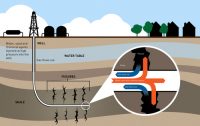Hydraulic Fracturing and Hydrocarbon Recovery—A Profitable Option
Hydraulic Fracturing and Hydrocarbon Recovery—A Profitable Option As millions of natural gas wells are developed using hydraulic fracturing methods, the resulting wastes in the form of flowback and produced waters contain a variety of man-made and naturally occurring components that must be managed safely. According to a recent white paper, one of these components, hydrocarbons, […]










